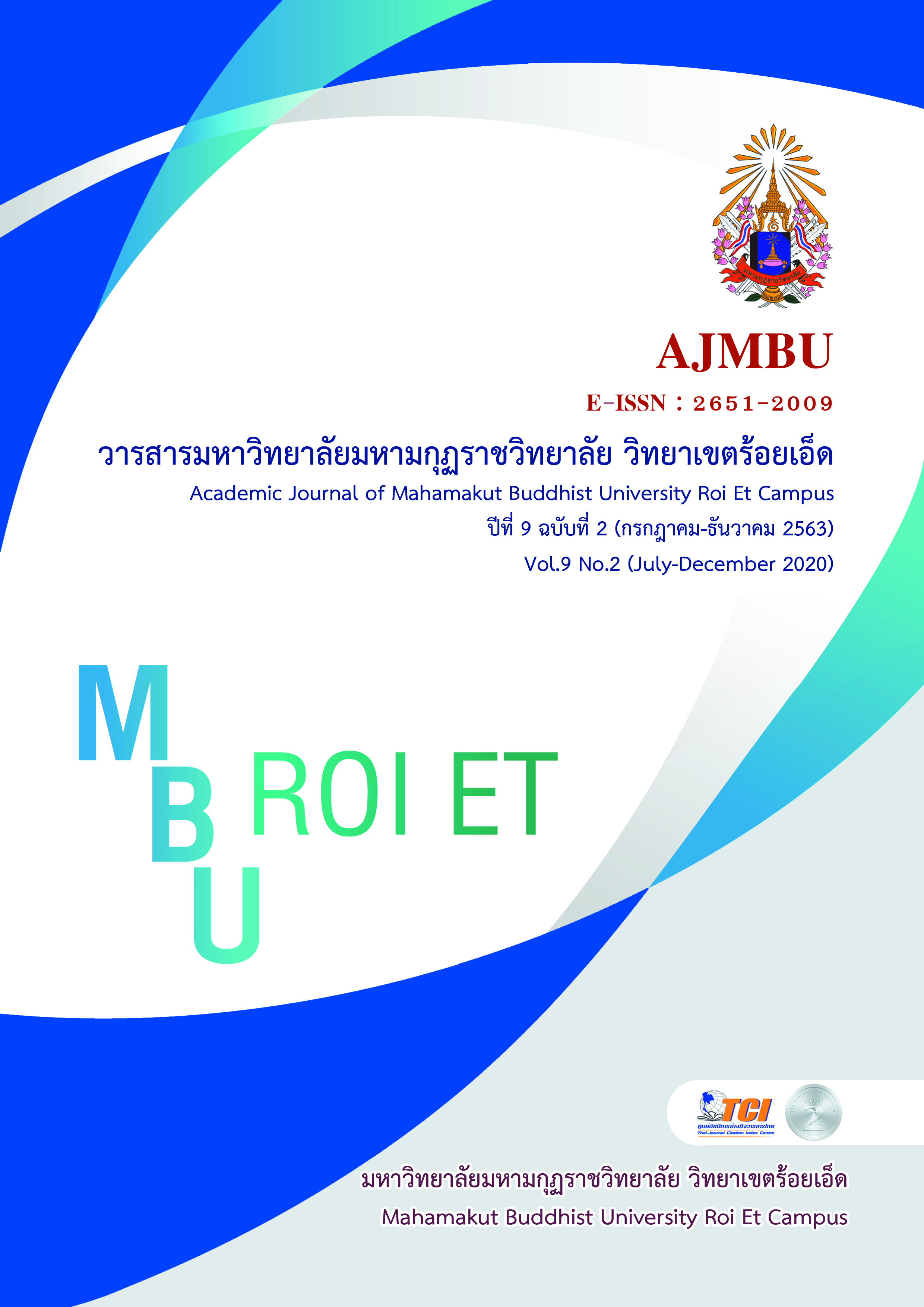An Application of Buddhist Doctrines to Promote the Well-Being of Ban Nong Bua Community, At Samat District, Roi-Et Province
Main Article Content
Abstract
The objectives of the research article were 1) to study the well-being problem of Ban Nong Bua community, At Samat district, Roi-Et province; 2) to study the Buddhist doctrines and the well-being of Ban Nong Bua community, At Samat district, Roi-Et province; and 3) to apply the Buddhist doctrines for promoting the well-being being of Ban Nong Bua community, At Samat district, Roi-Et province. This research is a qualitative research by studying data from documents and interviews.
The research results were as follows: 1. The problems of the people in Ban Nong Bua community are due to society, economics, cultures, safety conditions that appear in the present, and the daily life of the people that are both happy and suffering in many different dimensions and sources. 2. The study found that the Buddhist doctrine that could be applied with the well-being is Sangahavatthu or the Four Bases of Social Solidarity which is the principle of helping human beings to live together peacefully and to rely on in order to create unity. The principle comprises the following: 1) Dana refers to giving, generosity, sacrifice, and sharing things with each other, as well as providing knowledge and instruction; 2) Piyavaca refers to kindly and convincing speech; 3) Atthacariya refers to useful conduct, rendering services, as well as doing good; and 4) Samanattata refers to equality consisting in impartiality, participation and behaving oneself properly in all circumstances. 3. An application of the Buddhist doctrines to promote the well-being of Ban Nong Bua community, At Samat district, Roi-Et province based on the Four Bases of Social Solidarity is to create happiness for the people in Baan Nong Bua community by organizing the project on “Sharing Suffering, Enriching Happiness Through Visiting Relatives in the Evening” and the Dhamma Center of Baan Nong Bua community, which is the way to create happiness by helping the people who are troubling with their career in daily life, quality of life from disaster, danger from the epidemic, elimination of larvae and dengue mosquitoes, registration of farmers for government assistance, the creation of reconciliation, unity, and harmony.
Article Details
References
พระพรหมคุณาภรณ์(ป.อ.ปยุตโต). (2543). ทางออกจากระบบเศรษฐกิจที่ครอบงำสังคมไทย. พิมพ์ครั้งที่ 3. กรุงเทพมหานคร : สหธรรมิก.
พระพรหมคุณาภรณ์(ป.อ.ปยุตโต). (2545). ธรรมนูญ : พุทธจริยธรรมเพื่อชีวิตที่ดีงาม. พิมพ์ครั้งที่ 11. กรุงเทพมหานคร : มูลนิธิพุทธธรรม.
พระพรหมคุณาภรณ์(ป.อ.ปยุตฺโต). (2557). พุทธธรรมฉบับปรับขยาย. พิมพ์ครั้งที่ 39. กรุงเทพมหานคร : โรงพิมพ์มหาวิทยาลัยมหาจุฬาลงกรณราขวิทยาลัย.
พระเมธีธรรมาภรณ์ (ประยูร ธมฺมจิตฺโต). (2541). คุณธรรมสำหรับนักบริหาร. กรุงเทพมหานคร : บริษัท สหธรรมิก จำกัด.
มหาจุฬาลงกรณราชวิทยาลัย. (2539). พระไตรปิฎกฉบับภาษาไทยฉบับมหาจุฬาลงกรณราชวิทยาลัย.กรุงเทพมหานคร : มหาจุฬาลงกรณราชวิทยาลัย.
วศิน อินทสระ. (2546). ทางแห่งความดี(ธรรมบท)เล่ม 2. กรุงเทพมหานคร : สำนักพิมพ์บรรณาคาร.
อรศิริ เกตุศรีพงษ์. (2550). สังคหวัตถุ 4 วัฒนธรรมองค์กรที่เอื้อต่อการจัดการความรู้. วารสาร Productivity World เพื่อการเพิ่มผลผลิต. 12(68). 43-46.


